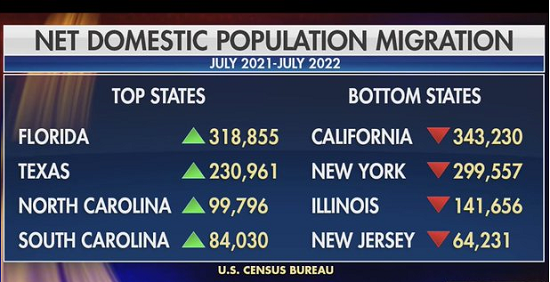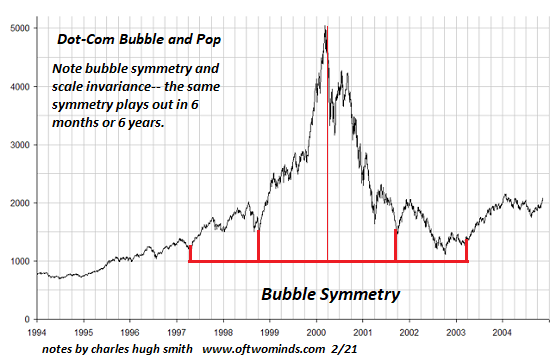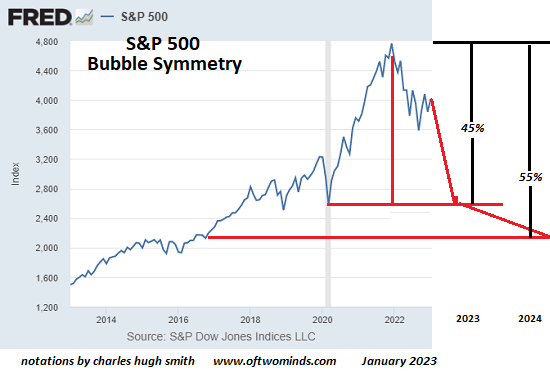Our time is better invested in actually learning about trends that impact us directly. Imagine making this simple change in your life: whatever you don’t control, you stop paying attention to it.This includes a vast array of “news” and “crises” that we have zero control over: the wretched flooding in Timbukthree, geopolitics, distant wars, macro-economic trends, politics above the micro-local level, and so on. Once we stop paying attention to everything we don’t control, what’s left to focus on? The simple answer is “whatever we do control,” which tends to be in our household or individual sphere of influence: the duties, habits and rituals of everyday life. In other words, we control our responses to whatever forces we don’t control. But wait a minute. Aren’t we
Topics:
Charles Hugh Smith considers the following as important: 5.) Charles Hugh Smith, 5) Global Macro, Featured, newsletter
This could be interesting, too:
Nachrichten Ticker - www.finanzen.ch writes Die Performance der Kryptowährungen in KW 9: Das hat sich bei Bitcoin, Ether & Co. getan
Nachrichten Ticker - www.finanzen.ch writes Wer verbirgt sich hinter der Ethereum-Technologie?
Martin Hartmann writes Eine Analyse nach den Lehren von Milton Friedman
Marc Chandler writes March 2025 Monthly
| Our time is better invested in actually learning about trends that impact us directly.
Imagine making this simple change in your life: whatever you don’t control, you stop paying attention to it.This includes a vast array of “news” and “crises” that we have zero control over: the wretched flooding in Timbukthree, geopolitics, distant wars, macro-economic trends, politics above the micro-local level, and so on. Once we stop paying attention to everything we don’t control, what’s left to focus on? The simple answer is “whatever we do control,” which tends to be in our household or individual sphere of influence: the duties, habits and rituals of everyday life. In other words, we control our responses to whatever forces we don’t control. But wait a minute. Aren’t we supposed to be “engaged, informed citizens” so we can make informed decisions? And doesn’t this require us to pay attention to everything presented to us as “newsworthy,” “a dangerous crisis” and of “pressing national interest”? That sounds nice, but precisely what “decisions” do we have a say in? We can vote for a toxic political party (there’s two choices! Wow!) or a candidate who raised big bucks by promising the moon to constituents and big-money contributors, and we can vote for or against a local bond issue or a local regulation that’s on the ballot. How great is our control of whatever we’re voting on? Shall we admit it’s negligible? Did anything we watched or read in the past few years change our minds, or do we vote pretty much as we’ve done for years because our views remain the same? For most people, the answer is “nothing I watched or read changed my views.” So what was the point of squandering hundreds of hours watching/reading “news,” “crises” and “commentary”? |
|
| These “decisions” come up every two years in some form. The rest of the time, exactly what is our control/influence? Posting tweets and social media comments? Uploading video rants? And how many people completely change their minds based on hyper-ventilating tweets or partisan outbursts, all of which tend to be one or two sentences long?
In today’s hyper-partisan divide, the short answer is “no one.” People tend to read what confirms their existing views and rage at whatever they disagree with. Neither changes any minds, nor engages those who have no interest in the staged spectacles in the Coliseum. If the entire media/social media “industry” boils down to bias confirmation and outrage that changes nothing, then isn’t the whole thing nothing but perverse, deranging entertainment? In other words, we enjoy confirming our biases and trashing those who disagree with us, and switching seamlessly between puppies and kittens and dire warnings of doom. The owners of media/social media know this, and so they go to great lengths to make their junk food for the mindespecially addictive. But there is an opportunity cost to investing so much of our time and energy in perverse entertainment, for those hours could have been invested in what we do control, i.e. our own lives. |
|
| This is the point of Self-Reliance: focus our time, capital and energy on what we do control and stop wasting time and energy on time-sinks and emotional mudpits we don’t control or influence at all.
Our time is better invested in actually learning about trends that impact us directly. Real learning takes time and study. This is the purpose of books. Other media are designed to influence without providing context or alternate histories. There is no way to cram the context and critiques into a short video program or a slide deck. Unfortunately, reading books that are substantial enough to add to our understanding is losing ground to spectacles, which are of course designed to be more fun than actual learning. Self-Reliance isn’t about controlling or influencing others, it’s about modifying our response to macro-trends so we not just survive but thrive. We don’t control our governance, economy or society, but we do control our response to unfavorable trends. We can change careers, change where we live, change who we associate with, expand our network of makers and producers and pursue many other consequential, positive actions. I’m not immune to the charms of puppies and kittens and impending doom, but the trick is to limit one’s exposure as one might do to any dangerous form of radiation: a few minutes is OK but then shut down the source and return to investing in our own life. |
Tags: Featured,newsletter



